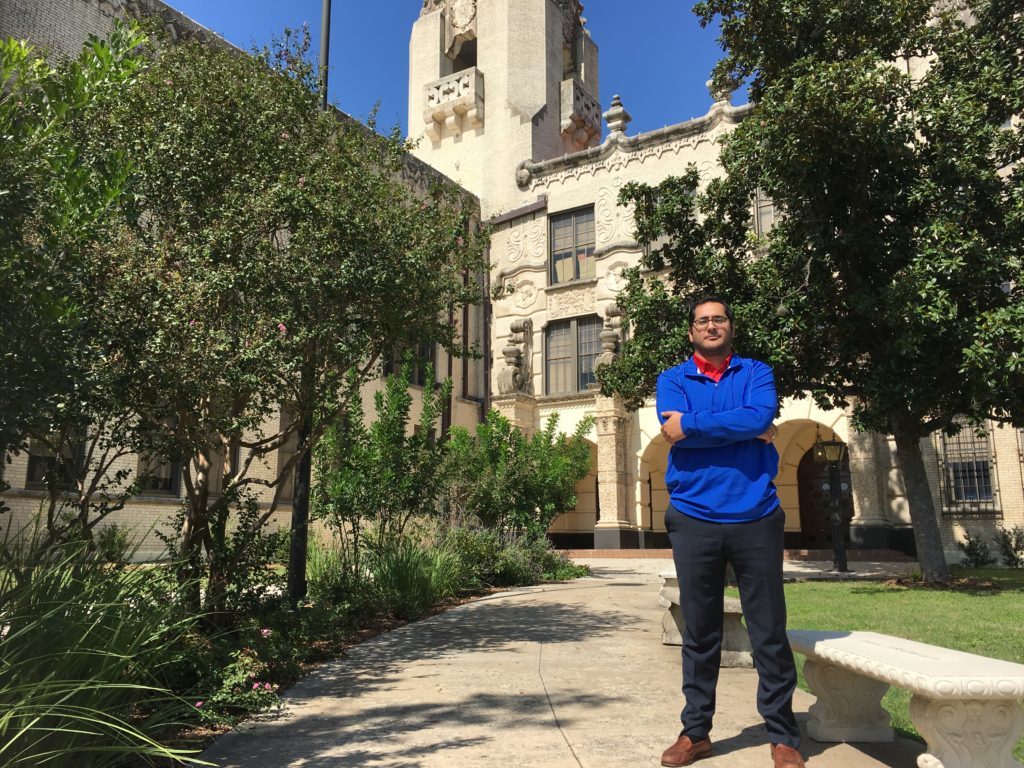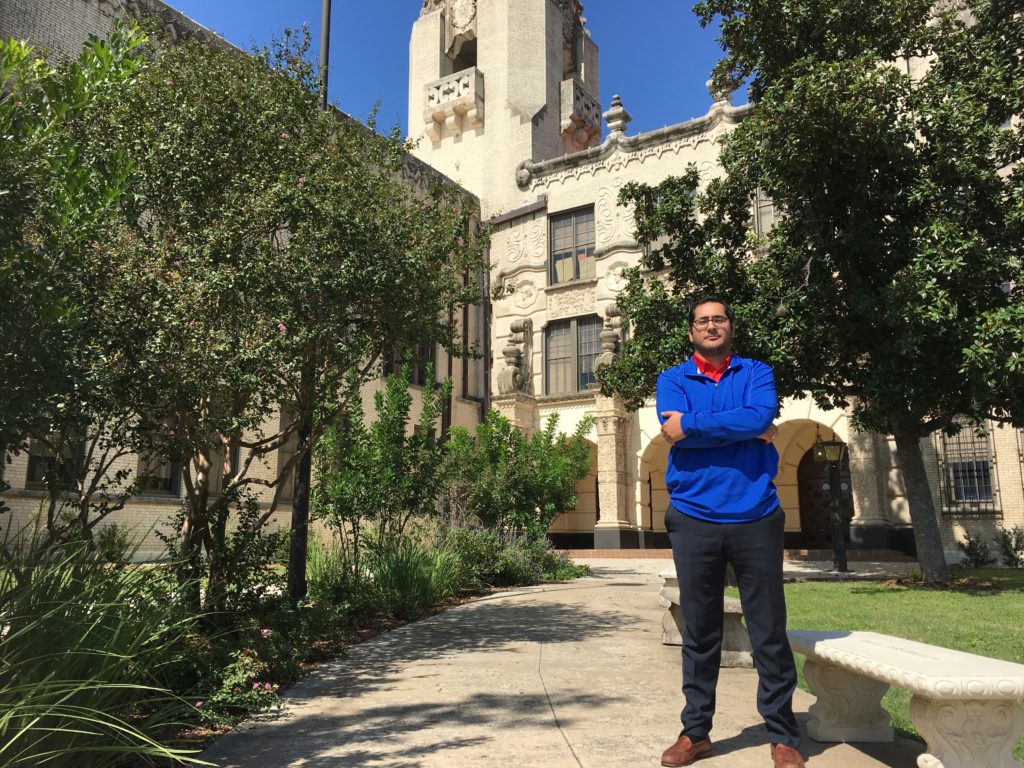Note from SA Charter Moms: We are proud to share guest posts from hallmonitor covering San Antonio’s public schools.

Pedro Escamilla, government teacher and voting enthusiast at Jefferson High School
Last year I wrote a story about high school voters. For several reasons, it never ran. However, given the battle for the polls at Texas State, and the coverage of young people casting their first ballots, I thought I’d pull it back up, update it, and put it out there.
Jefferson High School is a school with a political legacy. It has graduated mayors, congressmen, and state legislators. Former San Antonio Mayor Ed Garza represents the high school on the San Antonio ISD board, and often brings political aspirants through community booster meetings as a way of giving face time to both candidates and voters.
When I got an email in 2017 from a voting rights nonprofit claiming that high schools weren’t complying with their responsibility to register students to vote, I checked in with this politically super-enfranchised campus to see what was happening. The 2017 ballot was as boring as a ballot gets. Nothing like this year, when students are reportedly waiting in multi-hour lines at the polls.
In the run-up to the midterm elections, young Texas voters have come out in droves. Civic engagement nonprofit MOVE Texas, led by San Antonio’s H. Drew Galloway, has stirred up historic registration and voter turnout on college campuses, and among young people in general. Hillary Clinton congratulated the organization via social media for persuading Hays County to re-open early voting on the Texas State campus. Actor John Cusack has also praised MOVE Texas on social media.
While people under 30 typically have very low turnout, political data collector Target Smart reported that seven percent of all ballots cast in Texas, as of October 27, were cast by people under 30. That, tweeted Target Smart CEO Tom Bonier, is the highest youth vote he’s seen in the country.
While the November 2017 constitutional amendment election might not have evoked the same eager anticipation, for Robert Dewit, then 18, the excitement wasn’t about what was on the ballot, but rather his ability to cast one.
Dewit, along with a cohort of his classmates from Jefferson High School, handed in voter registration forms in October 2017, just before the November election deadline. Jefferson Principal Orlando Vera registered the students, a responsibility conveyed to him by a 1983 Texas law requiring high schools to register students to vote at least twice per year. State law allows anyone turning 18 within the next 10 months to register to vote, meaning that most people become eligible during their junior or senior year of high school.
The law makes all high school principals “high school deputy registrars” and also allows for another member of staff or faculty to assume that responsibility. At Jefferson, Pedro Escamilla, the 11th grade Government and Economics teacher, usually leads the voter registration initiative. It’s a reprisal of a role he played at Lanier High School, also in San Antonio ISD.
In both cases, the school had been registering students to vote before Escamilla worked there. While he’s passionate about helping students engage the political process, he never felt that compliance with the law was an uphill battle with his administration. The only “crusade” element was combing through rolls to find out which students were eligible to register, he said.
This is not the case at every school, said Cassandra Champion, Staff Attorney with the Texas Civil Rights Project in 2017.
Low voter turnout among young adults in Texas led the Texas Civil Rights Project to look into the 1983 law and how it affected voting habits of young adults.
“It really comes down to us wanting to engage young voters as early as possible,” Champion said, “There have been some studies that show early civic engagement leads to sustained civic engagement.”
The advocacy group found that many high schools were out of compliance with the law in 2017, and even fewer were taking advantage of a service through the Texas Secretary of State’s office which supplies voter registration forms when principals request them. Texas Civil Rights Project reported that 198 out of 1,428 public high schools in Texas requested voter registration applications from the Secretary of State. Some of those who did request some forms did not request enough to cover all eligible voters, the report says.
In Bexar County in 2017, only six high schools —McCollum High School and Tejeda Academy in Harlandale ISD, Somerset High School, Madison High School in North East ISD, Harmony Science Academy, and School of Science and Technology— requested registration forms from the Secretary of State. Others, like Jefferson and Lanier, go through the Bexar County Elections Commission.
This year, student interest is very high, Escamilla said. The school enlisted the help of the Educators Voter Registration Initiative, a group staffed mostly by retired educators, to come to campus and register students. On Friday, an SAISD school bus full of 18-year-old Jefferson High School students will go to the Wonderland of the Americas mall to vote.
By bringing yearly voter registration to the students, Escamilla said, they learn the value of the political participation, even when candidates are not in the headlines. At Jefferson, Escamilla and Dewit agreed, enthusiasm for voting peaked during presidential election years. Though Escamilla said that this year has been close. President Donald Trump’s rhetoric has deeply affected the majority Hispanic school.
“The current political climate from the top, with Trump, has led to a lot of students asking questions,” Escamilla said.
He doesn’t tell them how to vote, but he does try to give them firsthand exposure to the politicians themselves. This year his classes watched parts of the San Antonio debate between Ted Cruz and Beto O’Rourke. Most students, from what he’s overheard, sound like they’ll be voting for O’Rourke.
Not every year will have an exciting race. Escamilla wants students to get in the habit of voting even in years like 2017, because those elections still affect their lives.
While many of his peers see the importance of voting, Dewit said, back in 2017, “the reason people don’t vote is inconvenience.” The idea of a mobile-based voting system appeals to high school students, he said, “as long as its secure.” The high school senior estimated that just less than half of his friend have strong enough political views to vote, regardless of inconvenience. A handful of those go to the extra trouble to learn about every candidate and ballot measure, information that isn’t always easy to come by. If the entire process were more accessible, more people would do it, Dewit said. When you add layers of difficulty to democracy, “it erodes the democracy.”
Voter registration practices play an important role in partisan politics, Champion said. The majority of Texans register through the DMV, but voter registration drives play an important role in low income communities and communities where it is less likely that all adults will have government issued IDs. Voter registration drives depend on volunteers and community activism, which are not always evenly distributed. Catching kids in high school bridges some of the gaps that develop later. High schools, Champion said, are also one of the few places to get an accurate sample of the population. “The demographics of Texas are changing rapidly, and our schools reflect that. It’s the perfect place for non-partisan studies,” she said.
Originally published as “Stoking voter culture is a duty and a privilege at Jefferson High School,” Hall Monitor, October 29, 2018
Read more:
- “[Hall Monitor] Fifth Grade Student Body President Ramps Up Empathy, Civic Engagement,” San Antonio Charter Moms, November 17, 2018
- “[Hall Monitor] School Building to Be Renamed to Honor the Legacy of Bill Davis,” San Antonio Charter Moms, November 10, 2018
- “[Hall Monitor] SAISD Is About to Find Out What It Looks Like When Educators Design Their Own Schools,” San Antonio Charter Moms, October 27, 2018
- “[Hall Monitor] Educate 210 Aims to Give Teachers VIP Access to San Antonio,” San Antonio Charter Moms, October 20, 2018
- “[Hall Monitor] South San Methodically Pulling Levers to Win Back Students and Improve Schools,” San Antonio Charter Moms, October 13, 2018
